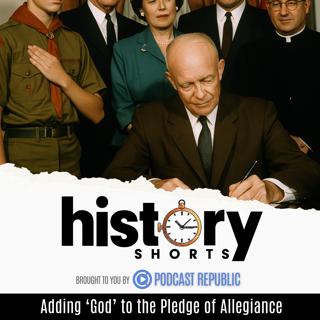
Socrates the Warrior
In this episode, we uncover Socrates’ military career, examining how his time as a hoplite in the Peloponnesian War influenced his philosophy, honed his courage, and shaped the ethical convictions that would define his legacy. Explore the battlefield wisdom of history’s greatest thinker. DON’T FORGET TO SUBSCRIBE AND LEAVE A RATING OR A REVIEW! THANK YOU IN ADVANCE! SUPPORT THE SHOW: https://www.patreon.com/c/HistoryShortsPodcast ADVERTISE: https://www.historyshortspodcast.com/advertise LEARN MORE: https://www.historyshortspodcast.com/ SPONSORED BY: https://www.podcastrepublic.net/get-it-now
25 Aug 7min

Native American Scouts of the Civil War
During the Civil War, thousands of Native Americans served as scouts, guides, and soldiers, navigating the complex loyalties of tribes split between the Union and Confederacy. Many fought to protect homelands, secure promises of sovereignty, or gain advantage over rivals, while others were drawn in by broken treaties or political pressure. DON’T FORGET TO SUBSCRIBE AND LEAVE A RATING OR A REVIEW! THANK YOU IN ADVANCE! SUPPORT THE SHOW: https://www.patreon.com/c/HistoryShortsPodcast ADVERTISE: https://www.historyshortspodcast.com/advertise LEARN MORE: https://www.historyshortspodcast.com/ EPISODE SPONSOR: https://www.podcastrepublic.net/get-it-now
24 Aug 9min

Justinian's Quest to Unify the Roman Empire
In the sixth century, Emperor Justinian I of the Eastern Roman Empire sought to restore the Roman world, with Rome itself as his ultimate prize. Beginning in 533 CE with the swift reconquest of the Vandal Kingdom in North Africa, Justinian unleashed his brilliant general Belisarius on the Ostrogoth-controlled Italian Peninsula. After taking Sicily and Naples, Belisarius entered an undefended Rome in 536, only to face a massive year-long Gothic siege that he repelled through ingenuity and discipline. The wider Gothic War dragged on for years, culminating in Belisarius’s capture of Ravenna in 540 and the brief illusion of total victory. DON’T FORGET TO SUBSCRIBE AND LEAVE A RATING OR A REVIEW! THANK YOU IN ADVANCE! SUPPORT THE SHOW: https://www.patreon.com/c/HistoryShortsPodcast ADVERTISE: https://www.historyshortspodcast.com/advertise LEARN MORE: https://www.historyshortspodcast.com/ EPIOSODE SPONSOR: https://www.podcastrepublic.net/get-it-now
23 Aug 12min

Conversations: The Marine "Bastard" Battalion, w/ Gregg Zoroya
In this powerful episode, we’re joined by award-winning journalist and author Gregg Zoroya to discuss his gripping new book, Unremitting: The Marine "Bastard" Battalion and the Savage Battle That Marked the True Start of America’s War in Iraq. This is the untold story of 2nd Battalion, 4th Marines, known as the “Magnificent Bastards,” and the brutal, underrecognized battle they fought in Ramadi in April 2004. While Fallujah would come to dominate headlines, it was in Ramadi—just days earlier—that the insurgency launched its full fury. DON’T FORGET TO SUBSCRIBE AND LEAVE A RATING OR A REVIEW! THANK YOU IN ADVANCE! SPONSORED BY THE COLLECTOR: www.thecollector.com LEARN MORE AT: www.historyshortspodcast.com SUPPORT THE SHOW: https://www.patreon.com/c/HistoryShortsPodcast ADVERTISE: https://www.historyshortspodcast.com/advertise SUPPORT THE SHOW: https://www.patreon.com/c/HistoryShortsPodcast LEARN MORE: https://www.historyshortspodcast.com/ THIS WEEK'S THE COLLECTOR ARTICLE SELECTION What were the sociocultural Effects of the Iran-Iraq War? What is the difference between Sunni and Shia Islam?
22 Aug 21min

Stealing the Superfortress
When three gleaming American B-29 Superfortresses made emergency landings in Soviet-held territory in 1944, it set in motion one of the most audacious acts of Cold War-era technological theft the world had ever seen. The Boeing B-29, the giant four-engine heavy bomber that carried the destructive promise of American airpower, was unlike anything the Soviets had in their arsenal. Stalin, paranoid as ever and obsessed with catching up to American military technology, immediately saw an opportunity that could not be wasted, and ordered his aviation industry to seize the aircraft, dissect them meticulously, and produce exact copies, down to the rivets. DON’T FORGET TO SUBSCRIBE AND LEAVE A RATING OR A REVIEW! THANK YOU IN ADVANCE! SUPPORT THE SHOW: https://www.patreon.com/c/HistoryShortsPodcast ADVERTISE: https://www.historyshortspodcast.com/advertise LEARN MORE: https://www.historyshortspodcast.com/ EPISODE SPONSOR: https://www.podcastrepublic.net/get-it-now
21 Aug 13min

Adding 'God' to the Pledge of Allegiance
The phrase “under God” was not part of the original Pledge of Allegiance written by Francis Bellamy in 1892, but was added in 1954 amid Cold War tensions as a symbolic stand against “godless communism.” Spurred initially by the Knights of Columbus and later galvanized by a sermon heard by President Dwight D. Eisenhower, Congress quickly passed and Eisenhower signed the amendment on Flag Day, framing it as a reaffirmation of America’s spiritual unity. DON’T FORGET TO SUBSCRIBE AND LEAVE A RATING OR A REVIEW! THANK YOU IN ADVANCE! SUPPORT THE SHOW: https://www.patreon.com/c/HistoryShortsPodcast ADVERTISE: https://www.historyshortspodcast.com/advertise LEARN MORE: https://www.historyshortspodcast.com/ EPISODE SPONSOR: https://www.podcastrepublic.net/get-it-now
20 Aug 12min

History of the G-Men
The story of the G-Men begins in an era when America had no permanent federal detective force, relying instead on private agencies like the Pinkertons. Reformers pushed for an in-house corps, and in 1908 Attorney General Charles Bonaparte quietly created the Bureau of Investigation. Initially small and unarmed, its agents pursued cases like antitrust violations and land fraud, but World War I and the Red Scare expanded its reach. Scandals in the early 1920s brought in a young J. Edgar Hoover, who professionalized and modernized the Bureau. The rest, as they say, is history DON’T FORGET TO SUBSCRIBE AND LEAVE A RATING OR A REVIEW! THANK YOU IN ADVANCE! SUPPORT THE SHOW: https://www.patreon.com/c/HistoryShortsPodcast ADVERTISE: https://www.historyshortspodcast.com/advertise LEARN MORE: https://www.historyshortspodcast.com/ EPISODE SPONSOR: https://www.podcastrepublic.net/get-it-now
19 Aug 13min

The Search for 'Little Albert'
In 1919–1920, Johns Hopkins psychologist John B. Watson conducted the now-infamous “Little Albert” experiment to show that fear could be conditioned in humans, pairing a loud noise with a white rat until the infant subject, nicknamed Albert, reacted with distress to the rat and other furry objects. While the study became a classic example in psychology textbooks, it was deeply flawed: it involved only one child, lacked proper controls, and offered no deconditioning to reverse the fear. More importantly, Albert’s identity remained a mystery for decades - or, not. DON’T FORGET TO SUBSCRIBE AND LEAVE A RATING OR A REVIEW! THANK YOU IN ADVANCE! SUPPORT THE SHOW: https://www.patreon.com/c/HistoryShortsPodcast ADVERTISE: https://www.historyshortspodcast.com/advertise LEARN MORE: https://www.historyshortspodcast.com/ EPISODE SPONSOR: https://www.podcastrepublic.net/get-it-now
18 Aug 11min





















